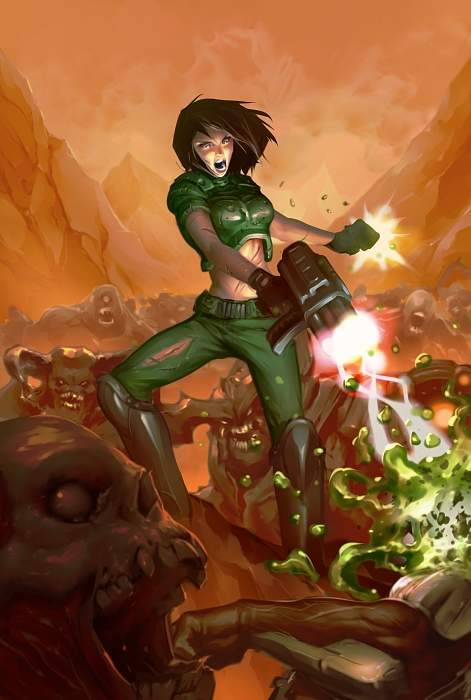- cross-posted to:
- [email protected]
- [email protected]
- cross-posted to:
- [email protected]
- [email protected]
If the billboards in Ivanovo are to be believed, Russia’s really going places.
“Record harvest!”
“More than 2000km of roads repaired in Ivanovo Region!”
“Change for the Better!”
In this town, a four-hour drive from Moscow, a giant banner glorifying Russia’s invasion of Ukraine covers the entire wall of an old cinema. With pictures of soldiers and a slogan:
“To Victory!”
These posters depict a country marching towards economic and military success.
But there is one place in Ivanovo that paints a very different picture of today’s Russia.
I’m standing outside it. There’s a poster here, too. Not of a Russian soldier, but a British novelist. George Orwell’s face stares down at passers-by.
The sign above it reads The George Orwell Library.
Inside, the tiny library offers a selection of books on dystopian worlds and the dangers of totalitarianism.
There are multiple copies of Orwell’s classic novel Nineteen Eighty-Four; the story in which Big Brother is always watching and the state has established near-total control over body and mind.
“The situation now in Russia is similar to Nineteen Eighty-Four,” librarian Alexandra Karaseva tells me. “Total control by the government, the state and the security structures.”
In Nineteen Eighty-Four, the Party manipulates people’s perception of reality, so that citizens of Oceania believe that “war is peace” and “ignorance is strength”.
Russia today has a similar feel about it. From morning till night, the state media here claims that Russia’s war in Ukraine is not an invasion, but a defensive operation; that Russian soldiers are not occupiers, but liberators; that the West is waging war on Russia, when, in reality, it was the Kremlin that ordered the full-scale invasion of Ukraine.
“I’ve met people who are hooked on TV and believe that Russia isn’t at war with Ukraine, and that the West was always out to destroy Russia,” Alexandra says.
“That’s like Nineteen Eighty-Four. But it’s also like Ray Bradbury’s novel Fahrenheit 451. In that story the hero’s wife is surrounded by walls that are essentially TV screens, talking heads telling her what to do and how to interpret the world.”
It was a local businessman, Dmitry Silin, who opened the library two years ago.
A vocal critic of the Russian invasion of Ukraine, he wanted to create a space where Russians could “think for themselves, instead of watching TV”.
Dmitry was later prosecuted for “discrediting the Russian armed forces”. He’d been accused of scrawling “No to war!” on a building. He denied the charge. He has since fled Russia and is wanted by police.
Alexandra Karaseva gives me a tour of the library. It’s a treasure trove of literary titans from Franz Kafka to Fyodor Dostoevsky. There is non-fiction, too; histories of the Russian Revolution, of Stalin’s repressions, the fall of communism and of modern Russia’s failed attempts to build democracy.
The books you can borrow here are not banned in Russia. But the subject matter is very sensitive. Any honest discussion of Russia’s past or present can bring problems.
Alexandra believes in the power of the written word to bring change. That’s why she is determined the library stays open.
“These books show our readers that the power of autocratic regimes is not forever,” Alexander explains. “That every system has its weak points and that everyone who understands the situation around them can preserve their freedom. Freedom of the brain can give freedom of life and of country.”
“Most of my generation had no experience of grassroots democracy,” recalls Alexandra, who is 68. “We helped destroy the Soviet Union but failed to build democracy. We didn’t have the experience to know when to stand firm and say ‘You mustn’t do this.’ Perhaps if my generation had read Ninety Eighty-Four, it would have acted differently.”
Eighteen-year-old Dmitry Shestopalov has read Ninety Eighty-Four. Now he volunteers at the library.
“This place is sacrosanct,” Dmitry tells me. “For creative young people it’s a place they can come to find like-minded citizens and to get away from what’s happening in our country. It’s a little island of freedom in an unfree environment.”
As islands go, it is, indeed, little. Alexandra Karaseva is the first to admit that the library has few visitors.
“[My generation] helped destroy the Soviet Union but failed to build democracy… Perhaps if we had read Ninety Eighty-Four, we would have acted differently.” – Alexandra Karaseva, Librarian
By contrast, I find a large crowd in the centre of Ivanovo. It’s not Big Brother people have stopped to listen to. It’s a Big Band.
In bright sunshine an orchestra is playing classic Soviet melodies and people start dancing to the music. Chatting to the crowd I realise that some Russians are more than willing to believe what the billboards are telling them, that Russia’s on the up.
“I’m happy with the direction Russia’s heading in,” pensioner Vladimir tells me. “We’re becoming more independent. Less reliant on the West.”
“We’re making progress,” says a young woman called Natalya. “As Vladimir Putin has said, a new stage for Russia has begun.”
But what about Russia’s war in Ukraine?
“I try not to watch anything about that any more,” Nina tells me. “It’s too upsetting.”
Back at the George Orwell Library they’re holding an event. A local psychologist is finishing a lecture on how to overcome “learned helplessness” and believe you have the power to change your life. There are ten people in the audience.
When the lecture ends, librarian Alexandra Karaseva breaks the news.
“The building’s been put up for sale. Our library has to move out. We need to decide what to do. Where do we go from here?”
The library’s been offered smaller premises across town.
Almost immediately one woman offers her van to help with the move. Another member of the audience says she’ll donate a video projector to help the library. Others suggest ideas for raising money.
This is civil society in action. Citizens coming together in time of need.
Admittedly, the scale is tiny. And there’s no guarantee of success. In a society with less and less space for “little islands of freedom,” the library’s long-term future is uncertain.
But they’re not giving up. Not yet.
Things are compared to 1984 so much I feel like we need to diversify the dystopian novels used as shorthand so it doesn’t lose meaning.
Literally Fahrenheit 451
Fahrenheit 451 is somewhat missunderstood as the author main intend was to warn of the then up and coming television tech.
It is kind of what happened too tbf
Literally brave new world
Just don’t think about the parallels between Soma and alcohol too much.
This is the best summary I could come up with:
“Total control by the government, the state and the security structures.”In Nineteen Eighty-Four, the Party manipulates people’s perception of reality, so that citizens of Oceania believe that “war is peace” and “ignorance is strength”.Russia today has a similar feel about it.
In that story the hero’s wife is surrounded by walls that are essentially TV screens, talking heads telling her what to do and how to interpret the world.”
There is non-fiction, too; histories of the Russian Revolution, of Stalin’s repressions, the fall of communism and of modern Russia’s failed attempts to build democracy.
That’s why she is determined the library stays open.“These books show our readers that the power of autocratic regimes is not forever,” Alexander explains.
In bright sunshine an orchestra is playing classic Soviet melodies and people start dancing to the music.
A local psychologist is finishing a lecture on how to overcome “learned helplessness” and believe you have the power to change your life.
The original article contains 970 words, the summary contains 158 words. Saved 84%. I’m a bot and I’m open source!
Wasn’t 1984 literally about Russia?
Headline should replace the word “now” with “still”.
Literally about Russia, no. Authoritarian systems that Orwell had personally seen the dark sides of, including the Soviets, Nazis, and the British Empire itself, yes.
Weird that people always forget he was also against literal British imperialism, for some reason, isn’t it?
It’s also heavily influenced by Yevgeny Zamyatin’s WE (as is Brave New World), and that is very much about Russia. (It’s also arguably the first dystopic novel.)
You thinking of Animal Farm? It’s a more direct allegory for the Soviet Union.
Can’t believe the library hadn’t been forcibly shut down.
Problem, if it is so dystopian why the library was not closed? 🤔
If you don’t openly go against the state no body cares about you. Its a small local library in a town of 400k people (2010 census) that has to move to a new area where even fewer people know of it.
I think two main reasons may be: in order to pretend things are done lawfully, and because the influence of such a small library is also super small.
The latter is more important, I think, if they don’t openly oppose war they may go on for a long time, I would guess. That is, until some overly eager citizen will not come up with a reason to snitch on them
It is indeed a boring dystopia, no harsh contrast, muted colours of propaganda, people half believing in it but really only wishing to be left alone, small-scale intellectual rebellion doomed from the start. It seems depressing to me
Also, no oppressive regime can ever actually achieve their goals or they would delegitimize themselves. It needs enemies to rally against and to justify its totalitarianism. And this little book store as you suggest allows them to both pretend to be lawful, and foster future “dissidents”.
I’m sure they have a list of all of the library’s customers as well.
Good point, albeit in this case that kind of legitimization is likely not needed, as they have enough of others to name them enemies
Go away Ork
let’s get our copy of 1984 out and have a look.
They didn’t prosecute Winston smith for buying illegal paper. They didn’t prosecute him for committing thought crime in the countryside. They went after him after he openly wanted to join the rebellion.
Only then they broke him.









